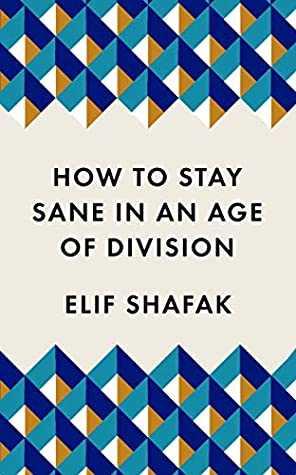Explore the World's Best Ideas
Join today and uncover 100+ curated journeys from 50+ topics. Unlock access to our mobile app with extensive features.
And the biggest irony is that all this is happening at a time when we as humans - regardless of race, gender, religion, class or ethnicity - are supposed to be more connected and empathetic and free than ever before, with far more opportunities at our disposal to express ourselves than our grandparents could have dreamed of, given the proliferation of both digital and media platforms.
How is it possible then that in an era when social media was expected to give everyone an equal voice, so many continue to feel voiceless?
ELIF SHAFAK
52
507 reads
We are made of stories - those that have happened, those that are still happening at this moment in time and those that are shaped purely in our imagination through words, images, dreams, and an endless sense of wonder about the world around us and how it works.
In losing our voice something inside us dies.
ELIF SHAFAK
51
418 reads
My first instinct as a storyteller is to dig into 'the periphery' rather than 'the centre' and focus my attention on the marginalised, underserved, disenfranchised and censored voices.
There is a part of me that wants to understand, at any moment in time, where in a society the silent letters are hidden.
ELIF SHAFAK
48
342 reads
The moment we stop listening to diverse opinions is also when we stop learning. Because the truth is we don't learn much from sameness and monotony. We usually learn from differences.
ELIF SHAFAK
56
335 reads
About groupthink or social media bubbles
They limit wisdom that connects the mind and the heart, help us reach beyond our mind and engage with others around us.
We must become intellectual nomads that keep moving, keep learning, spend more times in the margins, with the minorities, where real change happens.
49
279 reads
We dont' quite understand how the internet works but we don't want to say that aloud because everyone else seems to be ok with that, so we must accept it too.
More and more it feels that, when it comes to digital technologies, all the decisions are taken without us and despite us.
We are confused - but confused has now become a way of life.
ELIF SHAFAK
49
266 reads
We are exhausted by anxiety, consumed with anger, our minds and defences all too often overwhelmed.
ELIF SHAFAK
49
269 reads
Social media and group narcissism
We have become bad listeners and even worse learners.
Nuanced debates are not welcomed anymore, but dualities are exarcebated.
People are more interested in making a point, than learning.
53
243 reads
Feeling systematically unheard, unsupported and unappreciated can make me painfully resentful, and abiding resentment will probably turn me into a reluctant listener.
ELIF SHAFAK
48
251 reads
The truth is, there are plenty of negative sentiments all around and within us - anger, fear, discontent, distrust, sadness, suspicion, constant self-doubt... but perhaps more than anything, an ongoing apprehension.
An existential angst.
All these emotions are very much part of our lives now. Even digital spaces have become primarily emotional spaces.
ELIF SHAFAK
48
210 reads
We assume that we are alone are stumbling under their weight while everyone else is unencumbered, getting on with their lives just fine.
Emotions, we are taught to believe, make us look weak. The less we are capable of addressing negative emotions openly the longer it takes us to realise how many people are, in fact, struggling as we are, and how debilitating these silences are to our relations and interactions with others, and how, in an infinite numbers of indirect ways, they shape our societies.
ELIF SHAFAK
49
191 reads
Mass destruction doesn't start with concentration camps or gas chambers. It doesn't start with putting marks on neighbours' doors, just because they are 'different' - or imposing law for minorities to carry particular signs or wear certain clothes. Discrimination always starts with words.
It starts with language.
ELIF SHAFAK
53
200 reads
Knowledge requires reading. Books. Indepth analyses. Investigative journalism. Then there is wisdom, which connects the mind and the heart, activates emotional intelligence, expands empathy. For that we need stories and storytelling.
ELIF SHAFAK
49
193 reads
Now we are universally aware that history can go backwards, that progress is beyond such concerns. Now we are universally aware that history can go backwards, that progress is neither guaranteed nor steady. Democracy is hard to achieve, yet easy to lose; it is an interconnected system of checks and balances, conflicts, compromises and dialogues.
We all need to be more engaged, more involved citizens in whatever we might happen to be in the world.
ELIF SHAFAK
48
173 reads
Do not be afraid of complexity.
Be afraid of people who promise an easy shortcut to simplicity.
ELIF SHAFAK
52
193 reads
IDEAS CURATED BY
CURATOR'S NOTE
Powerful words for a time when wars and pandemics create an existential angst that is difficult to coexist with. Shafaks's words nudge us to question our place and our attitude in this world.
“
Curious about different takes? Check out our How to Stay Sane in an Age of Division Summary book page to explore multiple unique summaries written by Deepstash users.
Irina Bălan's ideas are part of this journey:
Learn more about books with this collection
How to beat procrastination
How to enhance your creative thinking
How to create a smooth transition in a new endeavor
Related collections
Different Perspectives Curated by Others from How to Stay Sane in an Age of Division
Curious about different takes? Check out our book page to explore multiple unique summaries written by Deepstash curators:
7 ideas
Discover Key Ideas from Books on Similar Topics
2 ideas
Two Things Can Be True At Once
collaborativefund.com
71 ideas
A New Earth
Eckhart Tolle
13 ideas
Enlightenment Now
Steven Pinker
Read & Learn
20x Faster
without
deepstash
with
deepstash
with
deepstash
Personalized microlearning
—
100+ Learning Journeys
—
Access to 200,000+ ideas
—
Access to the mobile app
—
Unlimited idea saving
—
—
Unlimited history
—
—
Unlimited listening to ideas
—
—
Downloading & offline access
—
—
Supercharge your mind with one idea per day
Enter your email and spend 1 minute every day to learn something new.
I agree to receive email updates















